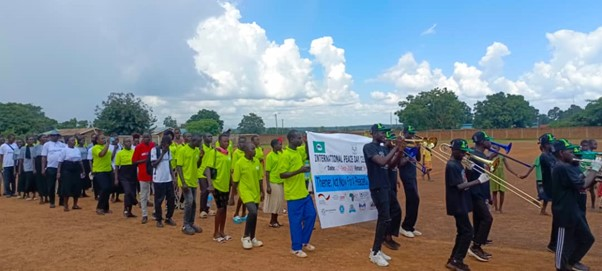🕊️ When Revenge Turns to Reconciliation: A Southern Unity story of community-led peacebuilding
- RSRTF South Sudan
- May 9, 2025
- 3 min read
Updated: May 13, 2025
In Southern Unity, reconciliation isn’t just a goal—it’s the starting point. And in Panyijiar County, where cattle raids, revenge killings, and state-citizen mistrust have defined everyday life for nearly a decade, the UN Multi-Partner Trust Fund for Reconciliation, Stabilization and Resilience (RSRTF) is showing what’s possible when communities lead the way to peace.
📍 The Conflict: Cross-Border and Within
Panyijiar has long been an epicentre of conflict. Armed youth from the area have clashed repeatedly with counterparts in Yirol East in a cycle of cross-border cattle raids.
Within the county itself, a bitter intra-communal feud between the Chiengnyaluok and Chienglual clans has simmered since 2016, claiming more than twenty lives.
Most recently, deadly confrontations between local government forces and armed youth on 18 November 2024 in Pachienjok left seven people dead, further eroding the fragile trust between citizens and authorities.
Combined with recurring floods and mass displacement, these layers of violence left Panyijiar deeply fractured.
But in early 2025, that began to change.
🔍 The RSRTF Approach: Rebuilding Peace from the Inside Out
RSRTF’s Southern Unity Area Based Programme consortium led by World Relief, helped revive local peace architecture by training respected community figures—elders, spear masters, women leaders, and religious actors—as mediators under the Peace and Reconciliation Action Committee (PRAC).

They identified flashpoints. They listened. And they acted.
These locally trusted individuals led a series of carefully organised community dialogues, beginning with a cross-border peace meeting at Koreer grazing land.
For the first time in years, rival youth groups from Panyijiar and Yirol East sat together, not as enemies, but as potential partners in reconciliation.
“We never thought we’d sit together again. But this dialogue showed us peace is still an option,” a Youth participant of the Koreer grazing land peace meeting said.

Building on this momentum of community-led peacebuilding, peace dialogues continued across the county. In Tiap Payam, leaders from the Chiengnyaluok and Chienglual clans met in a long-overdue intra-communal mediation.
Women and youth held parallel dialogues to voice their own hopes and fears, creating inclusive spaces where healing could begin.
Perhaps most remarkably, a direct dialogue was held between the local government and the armed youth they had previously fought—a difficult, emotional conversation that signalled the beginning of restored trust in civic institutions.

These interventions were not isolated gestures, but part of a broader strategy involving multiple implementing partners in the consortium including the UN Mission in South Sudan (UNMISS), International Rescue Committee (IRC), Universal Intervention and Development Organization (UNIDOR), Dialogue Research Institute (DRI) and Assistance Mission for Africa (AMA).
🛠️ From Fragility to Stabilization
RSRTF’s approach emphasises joint planning between local authorities and community actors, enabling a shared response to violence that is both credible and context-sensitive.
From the identification of conflict triggers to the facilitation of dialogue, every step is grounded in local leadership and legitimacy.
As one elderly woman put it, “We are grateful to this project. Your support has restored our hope to live in this community.”

A spiritual leader, the revered Spear Master, urged participants to end the cycle of revenge and walk the path of peace, reminding them that violence need not define their future.
“Let us not kill again. Let us walk with RSRTF and choose peace,” the spear master said.
Even the County Commissioner stood before the community and pledged his office’s commitment to supporting reconciliation efforts.
These efforts in Panyijiar reflect RSRTF’s results framework in action. They are reducing inter-communal violence, fostering reconciliation, and restoring civic trust—creating the conditions for long-term stability.
🔚 Why It Matters
In a context where traditional responses to violence have often relied on retaliation, RSRTF is helping communities chart a new course: one that centres dialogue, cooperation, and mutual accountability.
In Panyijiar, peace is no longer just a dream—it’s a choice communities are beginning to make. And RSRTF is making sure they have the tools, the trust, and the support to do so. The UN Multi-Partner Trust Fund for Reconciliation, Stabilization and Resilience in South Sudan (RSRTF) is a multi-partner initiative supporting community-driven peacebuilding and recovery in South Sudan’s most fragile regions. Launched in 2018, RSRTF brings together the political reach of the UN Mission in South Sudan (UNMISS) with the operational strengths of UN agencies and NGOs. It is generously supported by contributing partners including Canada, European Union, Netherlands, Germany, Norway, Sweden, Switzerland and South Korea—whose support enables locally led solutions to conflict, displacement, and instability.




Comments